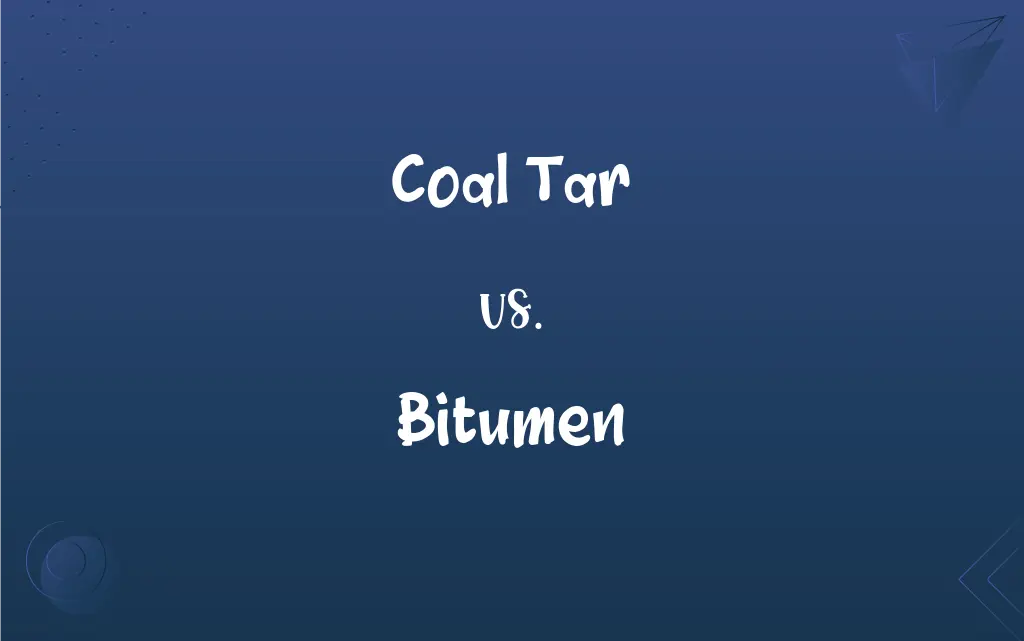Coal Tar vs. Bitumen: What's the Difference?
Edited by Harlon Moss || By Janet White || Published on December 27, 2023
Coal tar is a byproduct of coal processing, used in medicinal and industrial applications, while bitumen, a petroleum product, is primarily used for road construction and waterproofing.

Key Differences
Coal tar is a thick, black liquid produced during the process of converting coal into coke or coal gas. It has a strong smell and is used in various industrial and medical applications. Bitumen, also a viscous black substance, is derived from crude oil during the refining process and is mainly used for road construction and as a waterproofing agent.
Coal tar contains a mixture of various phenols, polycyclic aromatic hydrocarbons (PAHs), and heterocyclic compounds. It is known for its antiseptic and anti-inflammatory properties, making it useful in treating skin conditions. In contrast, bitumen is a mixture of hydrocarbons and is used primarily for its adhesive and waterproofing properties in construction and paving.
Coal tar is less viscous than bitumen and has a lower melting point, which makes it more fluid at room temperature. It is often used in tar-based roofing materials and as a sealant. Bitumen, with its higher viscosity, is ideal for road surfaces as it forms a durable and weather-resistant layer when mixed with aggregate.
Environmental and health concerns are more pronounced with coal tar, due to its carcinogenic compounds. Its use is regulated in many countries. Bitumen, though also containing some harmful compounds, is generally considered less hazardous and is widely used in public infrastructure projects.
In terms of production, coal tar is a byproduct of the steel industry, where coal is coked to produce steel. Bitumen, on the other hand, is a primary product of the petroleum industry, obtained from the distillation of crude oil.
ADVERTISEMENT
Comparison Chart
Source
Byproduct of coal processing
Derived from crude oil
Main Uses
Medicinal, industrial sealants
Road construction, waterproofing
Viscosity
Lower, more fluid at room temp
Higher, more solid at room temp
Health Concerns
Contains carcinogenic compounds
Less hazardous, though contains hydrocarbons
Industry
Steel industry byproduct
Petroleum industry product
ADVERTISEMENT
Coal Tar and Bitumen Definitions
Coal Tar
A byproduct of coal processing, used in industrial applications.
Coal tar is used in the production of roofing materials.
Bitumen
A primary product of the petroleum industry.
Refineries produce bitumen during crude oil processing.
Coal Tar
A medicinal substance for treating skin diseases.
Coal tar shampoo helps in treating scalp psoriasis.
Bitumen
A waterproofing material in roofing and construction.
Bitumen is used in waterproofing flat roofs.
Coal Tar
A component in anti-dandruff and eczema treatments.
Coal tar creams are effective for eczema relief.
Bitumen
A material for sealing and insulating purposes.
Bitumen sealants are used in building foundations.
Coal Tar
A base material in manufacturing dyes and plastics.
Many synthetic dyes are derived from coal tar.
Bitumen
A binding agent in road construction.
Bitumen is mixed with aggregate to pave roads.
Coal Tar
A sealant in industrial and construction applications.
Coal tar is used to seal driveways and pavements.
Bitumen
A substance used in making asphalt.
Bitumen is a key component in asphalt for highways.
Bitumen
Any of various flammable mixtures of relatively nonvolatile hydrocarbons that occur naturally or are obtained by fractional distillation of petroleum. Bitumens are used for paving, roofing, and waterproofing. Also called asphalt.
Bitumen
A sticky, black, highly viscous liquid or semi-solid form of petroleum, burning with a bright flame. It occurs as an abundant natural product in many places, as on the shores of the Dead and Caspian Seas. It is used in cements, in the construction of pavements, etc.; Mineral pitch.
Bitumen
(by extension) Any one of the natural hydrocarbons, including the hard, solid, brittle varieties called asphalt, the semisolid maltha and mineral tars, the oily petrolea, and even the light, volatile naphthas.
Bitumen
Roads sealed with bitumen, as opposed to dirt roads.
Bitumen
(Canada) Canadian deposits of extremely heavy crude oil.
Bitumen
To cover or fill with bitumen.
Bitumen
Mineral pitch; a black, tarry substance, burning with a bright flame; Jew's pitch. It occurs as an abundant natural product in many places, as on the shores of the Dead and Caspian Seas. It is used in cements, in the construction of pavements, etc. See Asphalt.
Bitumen
By extension, any one of the natural hydrocarbons, including the hard, solid, brittle varieties called asphalt, the semisolid maltha and mineral tars, the oily petroleums, and even the light, volatile naphthas.
Bitumen
Any of various naturally occurring impure mixtures of hydrocarbons
FAQs
Is coal tar a natural product?
It's a byproduct of processing coal.
How is bitumen obtained?
From the distillation of crude oil.
Where is bitumen predominantly used?
In road construction and waterproofing.
Can coal tar be used in roofing?
Yes, especially in tar-based roofing materials.
Is bitumen a carcinogen?
It contains hydrocarbons, but is generally less carcinogenic than coal tar.
What is coal tar primarily used for?
Industrial applications and skin treatment products.
Are there medicinal uses for bitumen?
Not typically; it's mainly used in construction.
What makes bitumen ideal for roads?
Its high viscosity and durability.
Can coal tar be used in road construction?
It's less common due to its lower viscosity.
Is bitumen environmentally friendly?
It has environmental impacts, but is less hazardous than coal tar.
Can bitumen be used as a sealant?
Yes, it's used in construction for sealing.
Are there regulations on coal tar usage?
Yes, due to its carcinogenic properties.
Is coal tar used in dyes?
Yes, it's a base material for many synthetic dyes.
Can coal tar be used in asphalt?
It's not commonly used for asphalt.
Are both coal tar and bitumen black?
Yes, both are typically black and viscous.
Is bitumen used in the petroleum industry?
Yes, as a primary product.
Is bitumen safe for skin application?
No, it's not meant for medicinal use.
Does bitumen have a strong smell?
Yes, it has a distinct petroleum smell.
What industries produce coal tar?
The steel and coal processing industries.
How is coal tar different from crude oil?
Coal tar is a byproduct of coal, while crude oil is a natural resource.
About Author
Written by
Janet WhiteJanet White has been an esteemed writer and blogger for Difference Wiki. Holding a Master's degree in Science and Medical Journalism from the prestigious Boston University, she has consistently demonstrated her expertise and passion for her field. When she's not immersed in her work, Janet relishes her time exercising, delving into a good book, and cherishing moments with friends and family.
Edited by
Harlon MossHarlon is a seasoned quality moderator and accomplished content writer for Difference Wiki. An alumnus of the prestigious University of California, he earned his degree in Computer Science. Leveraging his academic background, Harlon brings a meticulous and informed perspective to his work, ensuring content accuracy and excellence.
































































